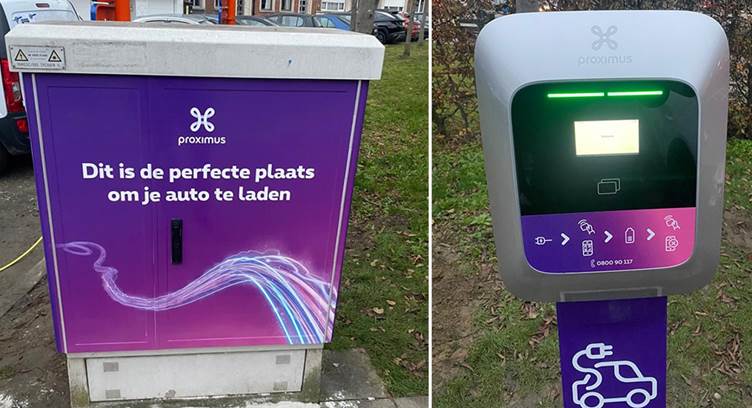Proximus and the city of Mechelen have joined forces to start a four-month pilot project in which charging stations for electric vehicles are connected to street cabinets with telecom equipment of Proximus.
The rise of electric vehicles is accelerating spectacularly. The most recent forecasts point to an increase in the number of electric cars in Belgium to 1.5 to 2 million by 2030. The Flemish Climate Plan that was recently approved, foresees that all newly purchased cars must be electric from 2029. The gradual electrification of the vehicle fleet is essential to achieve the carbon reduction objectives by 2030.
This pilot project with Proximus is a good example of how the city can find innovative and creative solutions to tackle these challenges. With 139 (semi-)public charging stations Mechelen already has the most charging poles per inhabitant. Since almost every pole has at least two charging points, this amounts to 278 charging units. In order to meet its target, the city must have 870 units by 2030, meaning that on average 6 units must be added per month.
As a socially responsible company, Proximus wants to lend a helping hand to achieve this objective. It is therefore looking into ways to convert part of its network of more than 28,000 street cabinets into power points for charging electric vehicles. Now that the roll-out of the fiber network is reaching cruising speed, fiber technology will replace the copper network in more and more places, freeing up space in street cabinets. With limited technical intervention, this space can be used to create additional charging infrastructure in a fairly simple way. Similar initiatives have already been launched in Germany, the United Kingdom and Austria.
Proximus' street cabinets have some interesting assets when it comes to creating new charging units for electric vehicles. Firstly, they are often located in key places in city centers, where there is a great need for public charging points and where part of the population lacks easy access to charging infrastructure. In addition, permit applications are handled collectively and therefore more efficiently, thanks to close cooperation with cities and municipalities. Finally, making maximum use of existing infrastructure can accelerate the deployment; the street cabinets are already powered by an electrical supply, which means that minimal excavation works are required.
Over the next four months, Proximus and the city of Mechelen, with support from Fluvius, will connect eight charging poles for electric vehicles to Proximus street cabinets. At each of these stations, always at strategic locations in the city, two vehicles will be able to charge simultaneously (11KVa per connector).
Guillaume Boutin, CEO of the Proximus Group
I would like to thank the city of Mechelen for participating in this pilot project. On the one hand, it highlights our openness to innovation, as we are the first telecom operator in Belgium to launch such an initiative. On the other hand, it shows that Proximus takes its social responsibility seriously by actively contributing to greener mobility and the reduction of carbon emissions.






















